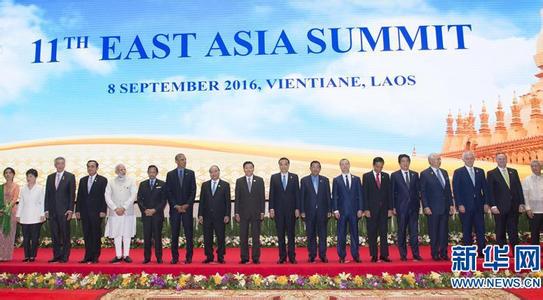李克強(qiáng)總理在第十一屆東亞峰會(huì)上的講話
Remarks by Premier Li Keqiang at the 11th East Asia Summit
來源:新華網(wǎng) 英文巴士 整理:泉州啟航翻譯公司
中華人民共和國國務(wù)院總理 李克強(qiáng)
H.E. Li Keqiang, Premier of the State Council of the People’s Republic of China
2016年9月8日,萬象
Vientiane, 8 September 2016

尊敬的通倫總理,
各位同事:
Prime Minister Thongloun Sisoulith,
Dear Colleagues,
很高興與各位同事在美麗的萬象相聚。
It gives me great pleasure to join you in the beautiful city of Vientiane.
當(dāng)前,世界政治經(jīng)濟(jì)格局正經(jīng)歷復(fù)雜深刻演變。全球經(jīng)濟(jì)增長乏力,貿(mào)易保護(hù)主義抬頭,政治安全沖突和動(dòng)蕩、難民危機(jī)、恐怖主義等地區(qū)熱點(diǎn)和全球性挑戰(zhàn)加劇,推動(dòng)世界經(jīng)濟(jì)穩(wěn)定復(fù)蘇、維護(hù)國際和平穩(wěn)定的任務(wù)緊迫而艱巨。東亞地區(qū)仍然被視作遠(yuǎn)離戰(zhàn)爭沖突的“凈土”和貿(mào)易投資較快發(fā)展的熱土。我們正是在和平穩(wěn)定的條件下才實(shí)現(xiàn)發(fā)展繁榮。這樣的局面來之不易,值得各方倍加珍惜。
The world political and economic landscape is undergoing complex and profound changes. There has been anemic global growth, resurfacing trade protectionism, and increasing regional hotspots and global challenges such as political and security conflicts and turbulence, refugee flow and terrorism. All this makes it imperative and daunting to promote steady world economic recovery and maintain international peace and stability. In comparison, East Asia is still regarded as a land free of war and conflict and a land of robust growth of trade and investment. It is with such peace and stability that we have achieved development and prosperity. Such achievements are hard-won and should be doubly cherished by all sides.
自2005年成立以來,東亞峰會(huì)為增進(jìn)各方理解與互信、促進(jìn)地區(qū)和平穩(wěn)定與發(fā)展繁榮作出了積極貢獻(xiàn)。如今東亞峰會(huì)已邁入第二個(gè)十年。各方應(yīng)珍惜和遵循東亞峰會(huì)積累的經(jīng)驗(yàn),把握正確方向,突出工作重點(diǎn),推動(dòng)?xùn)|亞合作行穩(wěn)致遠(yuǎn)。
Since its inception in 2005, the EAS has played a positive role in enhancing mutual understanding and mutual trust as well as regional peace, stability, development and prosperity. The EAS has now entered its second decade. Parties need to cherish and draw on the experience that the EAS has obtained, keep working in the right direction, highlight priorities, and secure steady progress for East Asian cooperation for the long run.
我們應(yīng)繼續(xù)堅(jiān)持東亞峰會(huì)作為“領(lǐng)導(dǎo)人引領(lǐng)的戰(zhàn)略論壇”定位,支持東盟中心地位,奉行協(xié)商一致、照顧各方舒適度等“東盟方式”,積極務(wù)實(shí)地推動(dòng)對話合作。中方支持峰會(huì)機(jī)制建設(shè),支持建立東盟秘書處東亞峰會(huì)小組。中方倡議由這一小組牽頭梳理《落實(shí)〈金邊發(fā)展宣言〉行動(dòng)計(jì)劃》的工作進(jìn)展,適時(shí)啟動(dòng)制定第二期行動(dòng)計(jì)劃,推動(dòng)峰會(huì)合作邁上新臺(tái)階。
We need to keep the EAS as a “l(fā)eaders-led” strategic forum, support ASEAN centrality, adhere to the ASEAN way of building consensus and accommodating each other’s comfort level, and advance dialogue and cooperation in a positive and pragmatic way. China supports institution building of the EAS and the setting up of an EAS unit of ASEAN Secretariat. China hopes that the unit will coordinate efforts to review progress in the Plan of Action to Implement the Phnom Penh Declaration on the EAS Development Initiative and that the drafting of a second-phase plan of action will be started in due course, so as to take EAS cooperation to new heights.
經(jīng)濟(jì)發(fā)展合作與政治安全合作是驅(qū)動(dòng)?xùn)|亞峰會(huì)的兩個(gè)“輪子”,應(yīng)該相互促進(jìn)、同步前進(jìn)。
Economic development cooperation and political and security cooperation are the two wheels driving EAS forward. They should reinforce each other and advance in parallel.
在經(jīng)濟(jì)發(fā)展方面,一是大力支持地區(qū)互聯(lián)互通。中方與老撾共同提議此次峰會(huì)發(fā)表《關(guān)于促進(jìn)東亞基礎(chǔ)設(shè)施發(fā)展合作的萬象宣言》,旨在為區(qū)域一體化注入持久動(dòng)力。中方愿與各方共同推動(dòng)“一帶一路”建設(shè),發(fā)揮好亞洲基礎(chǔ)設(shè)施投資銀行、絲路基金等融資平臺(tái)的作用,為地區(qū)互聯(lián)互通建設(shè)提供資金支持。二是加快推進(jìn)自貿(mào)區(qū)建設(shè)。中國和東盟正加緊推動(dòng)自貿(mào)區(qū)升級(jí)有關(guān)議定書成果落地。中方將與日本、韓國共同推動(dòng)中日韓自貿(mào)區(qū)談判盡早取得階段性成果。希望區(qū)域全面經(jīng)濟(jì)伙伴關(guān)系協(xié)定(RCEP)談判盡快完成,同其他自貿(mào)安排相互促進(jìn),共同推進(jìn)包容性的亞太自貿(mào)區(qū)建設(shè)。三是加強(qiáng)社會(huì)民生領(lǐng)域合作。中方將繼續(xù)舉辦好東亞峰會(huì)清潔能源論壇和新能源論壇,推動(dòng)相關(guān)技術(shù)和經(jīng)驗(yàn)交流。中方將繼續(xù)與地區(qū)國家積極開展教育政策對話,推動(dòng)培訓(xùn)研修和語言文化交流合作。
In economic development: first, we need to vigorously support connectivity building in the region. China and Laos have jointly proposed a Vientiane Declaration on Promoting Infrastructure Development Cooperation in East Asia to be issued at today’s EAS with a view to inject enduring impetus to regional integration. China hopes to work with all parties to promote development of the Belt and Road Initiative. We could use such financing platforms as the AIIB and the Silk Road Fund to provide capital support for regional connectivity. Second, we need to speed up the building of FTAs. China and ASEAN are stepping up efforts to deliver the outcomes of the protocol to upgrade the FTA, and China, Japan and the ROK will work together for early progress in the negotiations of the trilateral FTA. We hope to see early conclusion of the RCEP negotiations so that the RCEP and other free trade arrangements will reinforce each other and promote the development of an inclusive FTA of the Asia-Pacific. Third, we need to strengthen cooperation in areas related to people’s well-being. China will ensure success of the EAS Clean Energy Forum and EAS New Energy Forum, and will facilitate sharing of relevant technologies and experience. China will continue to engage actively in education policy dialogue with countries in the region and will encourage cooperation in training programs and exchanges in language and culture.
在政治安全方面,中國堅(jiān)持奉行大小國家一律平等、相互尊重的外交傳統(tǒng),倡導(dǎo)共同、綜合、合作、可持續(xù)的新安全觀,共同維護(hù)地區(qū)和平安寧。一是加強(qiáng)非傳統(tǒng)安全合作。當(dāng)前,恐怖主義、自然災(zāi)害、跨國犯罪、傳染性疫病等非傳統(tǒng)安全威脅日益凸顯,成為地區(qū)國家面臨的緊迫安全挑戰(zhàn)。中方愿與各方加強(qiáng)合作,共同應(yīng)對。2012年以來,中國和美國、聯(lián)合國相關(guān)機(jī)構(gòu)等方面舉辦了五次東亞峰會(huì)地震應(yīng)急演練,明年將舉辦第六次。中方將于明年舉辦東亞峰會(huì)海上搜救經(jīng)驗(yàn)交流研討會(huì)。二是探討區(qū)域安全架構(gòu)建設(shè)。東亞峰會(huì)作為戰(zhàn)略論壇,應(yīng)高度重視區(qū)域安全架構(gòu)問題,創(chuàng)新地區(qū)安全理念,構(gòu)建反映地區(qū)現(xiàn)實(shí)、符合各方需求的區(qū)域安全架構(gòu)。中方歡迎泰國明年主辦東亞峰會(huì)第六屆區(qū)域安全架構(gòu)研討會(huì),也愿積極考慮舉辦“二軌”研討會(huì)。三是妥善處理熱點(diǎn)敏感問題。本地區(qū)國家比鄰而居,就像舌頭和牙齒難免磕磕碰碰。相關(guān)當(dāng)事方應(yīng)秉持相互尊重、求同存異、和平共處的精神,通過直接談判與協(xié)商妥善處理矛盾分歧。在有關(guān)問題徹底解決前,應(yīng)開展對話,尋求合作,管控好分歧,不要讓矛盾由小變大、激化升級(jí)。
In the political and security area, China upholds the diplomatic tradition that all countries, irrespective of size, are equal and should respect one another; China champions a new vision of common, comprehensive, cooperative and sustainable security, and calls for joint efforts to uphold regional peace and tranquillity. First, we need to enhance non-traditional security cooperation. Non-traditional security threats such as terrorism, natural disasters, transnational crimes and infectious diseases are getting more prominent and posing imminent security challenges to countries in the region. China will step up cooperation with all parties to cope with these challenges. Since 2012, China, the United States and relevant UN agencies have held five rounds of earthquake emergency response exercises and will hold the sixth round next year. China will host a workshop to exchange experience in maritime search and rescue next year. Second, we need to explore building of the regional security architecture. The EAS, as a strategic forum, should pay high attention to the regional security architecture. It should foster a new thinking on regional security and build a regional security architecture that reflects the reality of the region and meets the need of all parties concerned. China welcomes the sixth Seminar on Regional Security Architecture to be hosted by Thailand next year and will consider holding a track-two workshop in this regard. Third, we need to properly handle hotspot and sensitive issues. Countries in this region live side by side as neighbors. Frictions are hardly avoidable, just like between the tongue and the teeth. Parties concerned need to adhere to the principle of mutual respect, seeking common ground while shelving differences and peaceful coexistence, and properly handle differences and disagreements through direct negotiation and consultation. Pending the final solution of relevant issues, it is important to carry out dialogue, seek cooperation, manage differences and frictions and prevent escalation of tension.
當(dāng)前,朝鮮半島形勢仍然復(fù)雜敏感。中方在朝鮮半島問題上的立場是一貫的。我們堅(jiān)持維護(hù)核不擴(kuò)散體系,堅(jiān)持實(shí)現(xiàn)半島無核化,堅(jiān)持維護(hù)半島和平穩(wěn)定,堅(jiān)持通過對話協(xié)商解決問題。各方要全面完整執(zhí)行安理會(huì)有關(guān)決議,共同努力維護(hù)半島和平穩(wěn)定,盡快使朝核問題回到通過對話談判解決的軌道上來。中國堅(jiān)決反對任何可能加劇地區(qū)緊張局勢的做法,歡迎所有有利于地區(qū)緩和的行動(dòng)和對話。
The
situation on the Korean Peninsula remains complex and sensitive. China’s position
regarding the Korean Peninsula is consistent. We are committed to the nuclear
nonproliferation regime, to denuclearization on the Peninsula, to maintaining
peace and stability there, and to resolving issues through dialogue and
consultation. Parties need to implement relevant UN Security Council
resolutions in their entirety. They need to work together to maintain peace and
stability on the Peninsula, and quickly bring the Korean nuclear issue back to
the track of dialogue and negotiation. China firmly opposes any move that might
aggravate tension in the region, and welcomes all actions and dialogue that are
conducive to easing tension in that part of the region.
剛才有些同事談到南海問題,我愿談幾點(diǎn)看法:
Just now, some colleagues talked about the South China Sea. For me, I wish to say the following.
第一,中國是《聯(lián)合國海洋法公約》的締約國,一貫忠實(shí)履行《公約》。根據(jù)《公約》,締約國擁有首先選擇直接對話協(xié)商方式和平解決爭端的權(quán)利。中方不接受、不參與仲裁等第三方解決程序,是在行使國際法也是《公約》賦予的權(quán)利。在場有的國家也采取過類似的立場。
First, China is a state party to UNCLOS and China implements the convention in good faith. According to UNCLOS, state parties have the right to primacy on peaceful settlement of disputes through direct dialogue and consultation. By not accepting and not participating in third-party settlement procedures like an arbitration, China is in fact exercising its right bestowed by international law including UNCLOS. The truth is, certain countries present here have also adopted similar positions.
第二,過去十多年南海地區(qū)保持和平穩(wěn)定,基礎(chǔ)是中國與東盟國家達(dá)成的《南海各方行為宣言》。《宣言》的制定基于并符合包括《公約》在內(nèi)的國際法原則與精神,已經(jīng)成為行之有效的地區(qū)規(guī)則。至于南海地區(qū)的航行和飛越自由,本來就不存在任何問題。按照《宣言》規(guī)定,南海有關(guān)爭議應(yīng)由直接當(dāng)事方通過談判協(xié)商和平解決。各方都應(yīng)堅(jiān)持這一規(guī)定,履行就此作出的承諾。單方面提起仲裁,引入第三方,違背了《宣言》。如果這個(gè)本地區(qū)最直接、最明確的規(guī)則不被遵守,問題會(huì)變得更加復(fù)雜,攪亂以規(guī)則為基礎(chǔ)的地區(qū)秩序,損害本地區(qū)和平穩(wěn)定。
Second, over the past decade or more, the Declaration on the Code of Conduct on the South China Sea agreed upon between China and ASEAN countries has served as a basis for peace and stability in the South China Sea. The DOC is formulated on the basis of and is in keeping with the principles and spirit of international law, UNCLOS included. It has become an effective norm for the region to act upon. Regarding the freedom of navigation and overflight in the South China Sea, there has been no problem whatsoever in the first place. According to the DOC, relevant disputes in the South China Sea shall be peacefully resolved by parties directly concerned through negotiation and consultation. All parties should follow this provision and honor their commitment made accordingly. Moves of unilaterally initiating arbitration and bringing in a third party constitute violations of the DOC. Non-observance of the most forthright and clear norms of the region will do nothing but further complicate the issue. It will disrupt the rules-based regional order and undermine peace and stability in the region.
第三,中方與東盟國家正在積極落實(shí)《南海各方行為宣言》,推進(jìn)“南海行為準(zhǔn)則”磋商,目的是為了更好地規(guī)范和處理南海問題,并在爭議解決之前管控分歧、化解矛盾、推進(jìn)合作。落實(shí)《宣言》是“準(zhǔn)則”磋商的基礎(chǔ),為了有效推進(jìn)“準(zhǔn)則”磋商,必須落實(shí)和恪守《宣言》,這符合各方利益。
Third, China and ASEAN countries are actively implementing the DOC and advancing consultations on a Code of Conduct. The purpose is to properly regulate and manage the South China Sea issue, and to address disputes, resolve disagreements and advance cooperation pending final settlement of disputes. Implementation of the DOC provides the basis for COC consultations. To effectively advance COC consultations, the DOC must be implemented and adhered to in good faith. This serves the interests of all parties.
昨天,中國—東盟領(lǐng)導(dǎo)人會(huì)議發(fā)表的主席聲明充分肯定了中國—東盟建立對話關(guān)系25年來取得的成就,并重申堅(jiān)持通過《宣言》以及正在商談的“準(zhǔn)則”妥善處理分歧,維護(hù)南海穩(wěn)定。會(huì)議還通過了“中國與東盟國家應(yīng)對海上緊急事態(tài)外交高官熱線平臺(tái)指導(dǎo)方針”和“中國與東盟國家關(guān)于在南海適用《海上意外相遇規(guī)則》的聯(lián)合聲明”。這些都充分表明,中國和東盟已經(jīng)找到了一條既體現(xiàn)國際法規(guī)則,又有效管用的辦法,也表明中方和東盟國家完全有智慧、有能力處理好南海問題。域外國家應(yīng)當(dāng)理解支持地區(qū)國家所做的積極努力,而不是渲染分歧,擴(kuò)大甚至制造矛盾。
The Chairman’s Statement issued at yesterday’s ASEAN Plus China Summit fully recognizes the achievements made over the past 25 years in China-ASEAN dialogue relations, and reiterates a commitment to properly handling disputes through the DOC and a COC now under consultation, in order to maintain stability in the South China Sea. The summit also adopted the Guidelines for Hotline Communications Among Senior Officials of the MFA of ASEAN Member States and China in Response to Maritime Emergencies and the Joint Statement on the Application of the CUEs in the South China Sea. All these fully demonstrate that China and ASEAN have found an effective way of dispute management that embodies the norms of international law. They also show that China and ASEAN countries have the wisdom and capability to properly handle the South China Sea issue. Countries from outside the region need to show understanding and support for the positive efforts made by countries in the region, and should not do things to play up the differences, or to expand or even trigger disputes.
中國始終從維護(hù)地區(qū)和平穩(wěn)定大局出發(fā),以建設(shè)性態(tài)度負(fù)責(zé)任地處理南海問題。中方愿與各方共同努力,將南海建設(shè)為造福地區(qū)各國人民的和平、合作、友誼之海。
China has acted in the larger interests of regional peace and stability and approached the South China Sea issue in a constructive and responsible manner. China stands ready to work with all parties concerned to make the South China Sea a sea of peace, cooperation and friendship for the benefit of people of all countries in the region.
各位同事,
Dear Colleagues,
東亞地區(qū)和平穩(wěn)定與繁榮發(fā)展仍然面臨巨大機(jī)遇。老撾有句諺語:一根木樁圍不成籬笆,一村人不協(xié)力建不好村寨。中方愿同各方齊心協(xié)力,推動(dòng)?xùn)|亞合作穩(wěn)步前進(jìn),為促進(jìn)地區(qū)和平穩(wěn)定與持久繁榮貢獻(xiàn)力量,造福各國人民。
East Asia now faces huge opportunities for peace, stability, prosperity and development. As a saying in Laos goes, “One trunk does not make a fence. And a village will not be a good place without every villager working for it together.” I hope that parties will work together to promote steady progress of East Asian cooperation and contribute to peace, stability and enduring prosperity of the region, the benefit of people of all countries.
謝謝大家!
Thank you.















